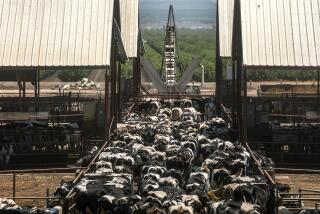Good News on 1st Condor Egg Produced in Captivity
- Share via
The first California condor egg to be produced in captivity is fertile, San Diego Wild Animal Park officials announced Monday.
“Sometime between April 28 and May 3, we should hatch a condor,” park spokesman Tom Hanscom said.
Keepers checked the fertility of the egg, which was laid last Thursday, by holding it up to a high intensity lamp. They detected a dime-sized spot at the tip of the egg’s yolk, an indication that the fetus’ circulatory system has begun to develop.
The egg will be kept in an incubator until it hatches.
Hanscom said that 13 California condors have been hatched through artificial incubation since 1983 from eggs that were found in the wild.
Hanscom said that “millions of dollars and hundreds of thousands of hours” have been spent on the effort to breed condors in captivity. The production of the fertile egg was a milestone event for those who have been working to save the endangered
species from extinction.
“Prior to last Thursday, the question lay in whether we could get a captive pair to breed and produce an egg,” Hanscom said. “Until Thursday, all it was was a hope.”
There are 27 remaining California condors, all living in captivity. Fourteen are at the Wild Animal Park; the remaining 13 are at the Los Angeles Zoo.
“As yet, the pair here has been the only viable pair, but this would indicate to us that we will be successful in future pairings,” Hanscom said.
Cathleen Cox, director of research at the Los Angeles Zoo, said she was very pleased by the news of the successful mating.
“There certainly were some people who did not believe the birds could reproduce in captivity,” Cox said.
Cox said that a pair of condors housed at the zoo have begun showing signs of mating activity and that she expects to see them produce an egg next year.
Meanwhile, Hanscom said that the San Diego pair may produce a second egg next month. The birds began to breed again last Friday, after their egg was taken away to the incubator, Hanscom said.
Condors usually produce only one egg per mating season, Hanscom said. But there have been instances where condors in the wild have produced a second egg after the first was taken away to be incubated artificially.
More to Read
Sign up for Essential California
The most important California stories and recommendations in your inbox every morning.
You may occasionally receive promotional content from the Los Angeles Times.










